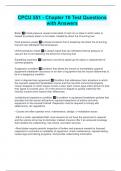CPCU 551 - Chapter 10 Test Questions with Answers Boiler ✅A fired pressure vessel constructed of cast iron or steel in which water is heated to produce steam or hot water. Heated by direct fire of burning fuel Fired pressure vessel ✅A closed container that is heated by the direct fire of burning fuel and can withstand internal pressure Unfired pressure vessel ✅A closed vessel that can withstand internal pressure or vacuum but is not heated by the direct fire of burning fuel Expediting expenses ✅Expenses incurred to speed up the repair or replacement of covered property Suspension condition ✅Condition that allows the insurer to immediately suspend equipment breakdown insurance on an item of equipment that the insurer determines to be in a dangerous condition Joint or disputed loss agreement ✅Condition that addresses claim situations in which the insured's equipment breakdown insurer and the insured's commercial property insurer disagree on which insurer covers a loss; each insurer pays entire amount of loss they agree is covered, plus 1/2 of t he amount in dispute to quickly indemnify the insured; insurers then resolve their differences. Jurisdictional inspections condition ✅A condition in equipment breakdown policies that provides that the insurer will perform required inspections of boilers and other equipment on the insured's behalf. INspection must be required to comply with state/county, etc regulations • Causes are often operator error, maintenance, design, or installation issues • EB is a small, specialized field; most insurers do not have the personnel to respond and the volume is too low to dominate; instead, insurers offer it as reinsured coverage that handles the underwriting, risk control, and claim services • Most states require periodic inspection of boilers and pressure vessels by licensed inspectors to comment on suitability of equipment, check maintenance, request testing, review logs and training programs, and provide underwriting information • Common types of breakdown to fired pressure vessels are explosion from excessive internal pressure, overheating from insufficient water, cracking from expansion and contraction, and bulging from improper heat transfer • Unfired pressure vessels are subject to explosion, cracking, bulging, and implosion; explosion is typically covered under normal commercial p ✅Equipment Breakdown Loss Exposures details part 1 • Combustion explosions are covered under normal commercial policy and not under EB unless endorsed for it • Electrical equipment breakdown frequently consists of shorting of windings, insulator/connector/control failure, bearing failure in rotating equipment, casting/rotor/shaft damage, or distortion/mechanical breakage of parts • Electrical EB causes frequently include surges, excess moisture, insulation deterioration, overhead conditions, lubrication failure, and improper repair • Mechanical equipment damage frequently consists of chipping of rotating elements, scoring of cylinder walls, breaking of gears/couplings, bearing failures, seizing • Mechanical equipment breakdown can be caused by metal fatigue, weld failure, insufficient lubrication, overspeed, stress, shock loads • AC/Refrigeration equipment damage frequently consists of control failure, vibration, lack of lubrication, improper control settings, a ✅Equipment Breakdown Loss Exposures details part 2 • Coverage for direct damage to covered property, which includes property the insured owns and property in the insured's c/c/c for which they are legally liable; must be situated at location in insured premises • Defense condition gives insurer the right, but not duty, to defend insured against suits from claims from property owners; some other EB policies obligate defenseƒeffo ✅Property Damage insuring agreement details • Covers expenses insured necessarily incurs to speed up repair/replacement of covered property; overlaps but is narrower than Extra Expense coverage ✅Expediting Expenses insuring agreement details • Covers spoilage of raw materials, property in process, or finished products while in storage or in course of manufacture; must result from lack/excess of heat, power, light, steam, or refrigeration; insured must own or be legally liable for property. Ins urer agrees to pay expenses insured incurs to reduce loss ✅Spoilage Damage insuring agreement details




